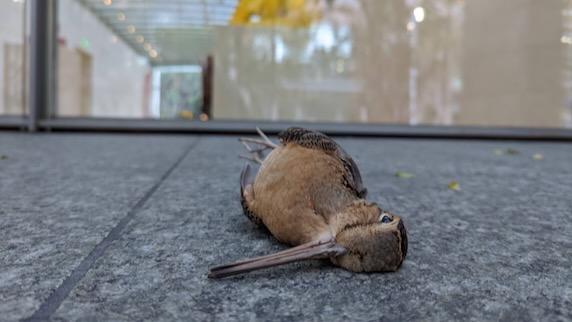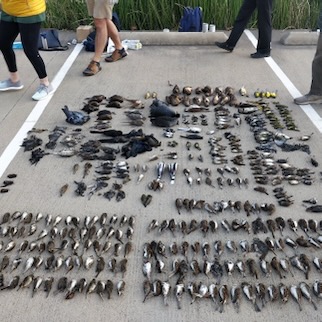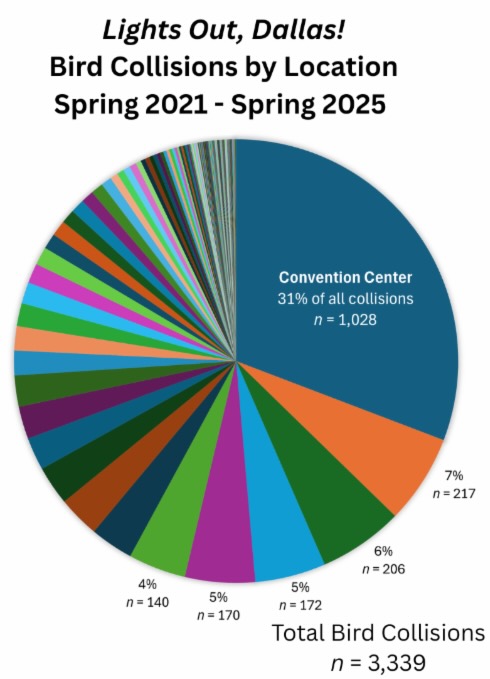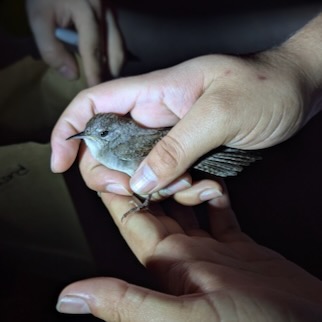
A bird killed by a building collesion in Downtown Dallas was likely drawn into danger by bright city lights. Courtesy of Texas Conservation Alliance.
A coalition of environmental organizations is mounting a campaign to persuade Dallas City Council to incorporate bird-friendly design features into the renovation of the Kay Bailey Hutchison Convention Center.
Texas Conservation Alliance, working alongside the Dallas Zoo, Environment Texas, Audubon Texas and the Trinity River Audubon Center, has identified the Dallas Convention Center renovation as a critical opportunity to address what they describe as a major contributor to structure-caused bird deaths in the city. The American Bird Conservancy is also providing technical support to the coalition.

Over the last four years, volunteers from these organizations have documented bird collisions in Downtown Dallas. They discovered that 31 percent of the deaths were incidents with the Dallas Convention Center building.
Meanwhile, Mei Ling Liu, community conservation director for Texas Conservation Alliance, says the contracted architectural firm Perkins and Will has released designs showing extensive use of glass panels in the proposed structure along with an expansive lighting system.
“If built as planned, the Convention Center may become an even deadlier trap for birds,” Liu says.
THE PROBLEM
The coalition's concerns stem from documented bird collisions at the existing Dallas Convention Center. Over the past four years, volunteers have collected data showing the facility as a significant collision site, and advocates emphasize that their findings represent only a small fraction of actual incidents.
"We don't search every single day," Liu says.

She added that a recent site visit revealed “feather prints on the glass,” which aren't counted in collision surveys and are potentially indicative of birds striking the glass and potentially dying elsewhere soon afterward.
The collisions escalate each fall and spring as the skies above North Texas fill with the wings of hundreds of millions of migratory birds. Warblers, thrushes, hummingbirds, rails and other species travel along what's known as the Central Flyway, navigating thousands of miles between their breeding grounds in the U.S. and Canada and wintering grounds in Mexico and South America.
Dallas, situated in the center of this flyway, is both a resting point and a hazard. Because many species migrate at night, bright lights confuse migrating birds who then descend into the city. There collisions with glass windows are an elevated risk as birds cannot see the glass and apparently mistake reflections of the sky or landscape for open space.
THE PROPOSED SOLUTION
The conservation organizations are therefore urging the city to make two primary design modifications to the Convention Center: the implementation of bird-safe glass and the use of lighting systems that comply with the standards established by DarkSky International, a non-profit organization, which researches and advocates for wildlife-friendly lighting methods.
Bird-safe glass incorporates visual elements such as dots or lines that break up reflections that make barriers visible to birds while maintaining aesthetic appeal. DarkSky-compliant lighting involves practices such as scheduling lights to be off during peak migration and the use of interior blinds and curtains to curtail light spillage. The nonprofit also encourages installing lighting instruments that prevent glare, reduce light pollution and minimize short-wave, bluish light.
Liu says its paramount we mitigate hazards to birds, which have seen a significant decline since the 1970s.
“Birds provide ecosystem functions for all of us," Liu says, citing their roles in pest control, biodiversity support and plant pollination. “And they provide a great revenue for tourism — bird watching is huge in Texas."
SUCCESSFUL PRECEDENT
The coalition points to the Javits Convention Center in New York City as a successful model. Following renovation about a decade ago, the facility was transformed from what Liu describes as "a giant box of glass" that generated community complaints regarding the seemingly endless presence of dead birds around the structure, into a bird-friendly oasis. The Center's expansion even implemented green roof space that now supports multiple bird species, monitored by the New York City Bird Alliance.
"The [Javits] Convention Center was really happy with the result," Liu says.
She noted that community perceptions shifted dramatically after the bird-safe improvements were made.
BUILDING COMMUNITY SUPPORT
Recognizing that bird-safe glass typically costs more than conventional glass, the coalition is building broad community support before approaching city officials. However, past projects, they say, have shown bird-safe features typically add less than two percent to total construction budgets.

Advocates have started dual petition drives: Dallas residents can add their names to a letter through the Audubon Texas website that will be sent directly to their council members, while residents throughout Dallas-Fort Worth suburbs and the state can show support through Environment Texas's petition website. Advocates are also seeking support letters and endorsements from nonprofits, businesses, and other partners in the region.
The coalition plans to compile all petition signatures and support letters for presentation to council members in early October.
STRATEGIC CONTEXT
The campaign aligns with Dallas's reputation for exemplary environmental stewardship and the Dallas Convention Center's history of sustainability, Liu says.
"The city of Dallas has been the leader when it comes to sustainability, and the Convention Center in the past has received multiple awards and recognitions," Liu points out. "So, this is a great opportunity for Dallas to [continue to] shine as a leader."
The potential impact extends well beyond Dallas, as convention centers in Houston, South Padre Island and Austin are also undergoing renovations. Success in Dallas could establish a precedent for bird-safe design and lighting throughout Texas.
The campaign also aligns with the Dallas Comprehensive Environmental and Climate Action Plan (CECAP), which highlights the city’s commitment to protect and enhance its ecosystems, trees and the green spaces to improve public health.
NEXT STEPS
Liu says so far neither the city nor the contracted architectural firm has acknowledged their concerns. Therefore, the coalition plans to approach the City Council in early October 2025 with ample evidence of broad public backing for incorporating bird-friendly design into the renovation project.
As urban development expands, Liu says, the Dallas Convention Center campaign represents a growing sense of urgency to balance design ambitions with environmental responsibility and thus raise the bar for public building projects.
“Dallas can be a leader in implementing bird-safe design and become a great example for other cities to follow,” Liu says.
PETITIONS
Audubon Texas Petition for Dallas residents:
Environment Texas Petition for Texas Residents
